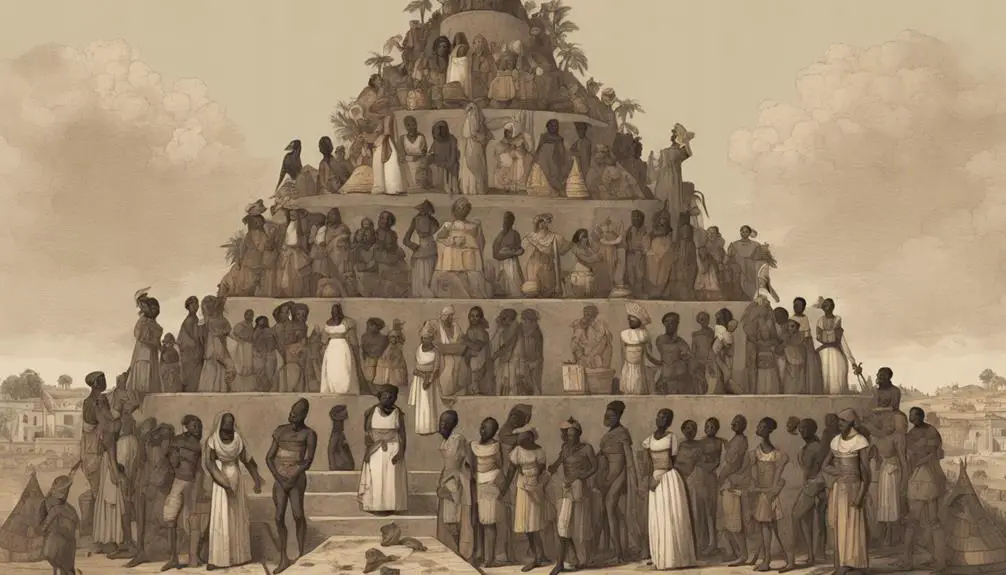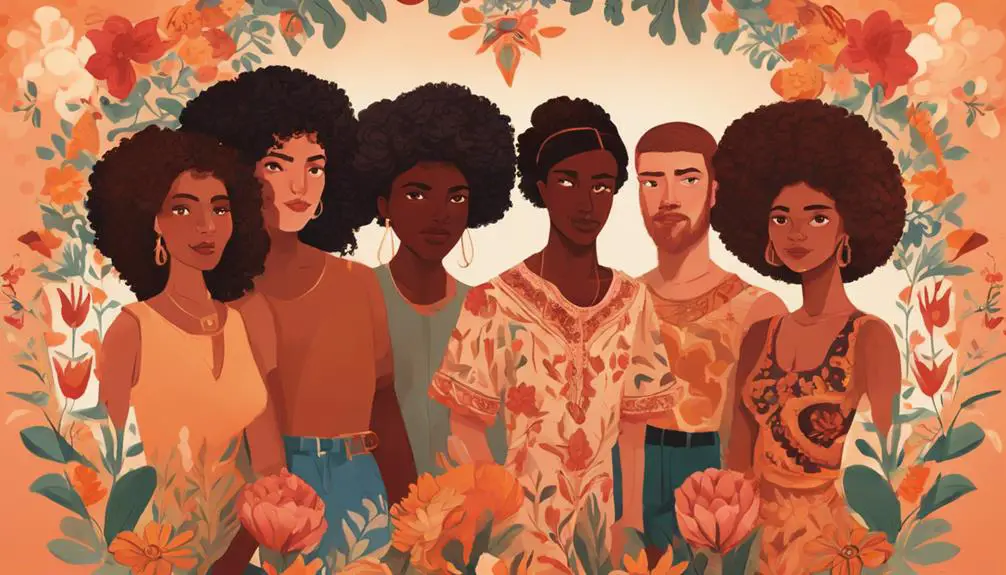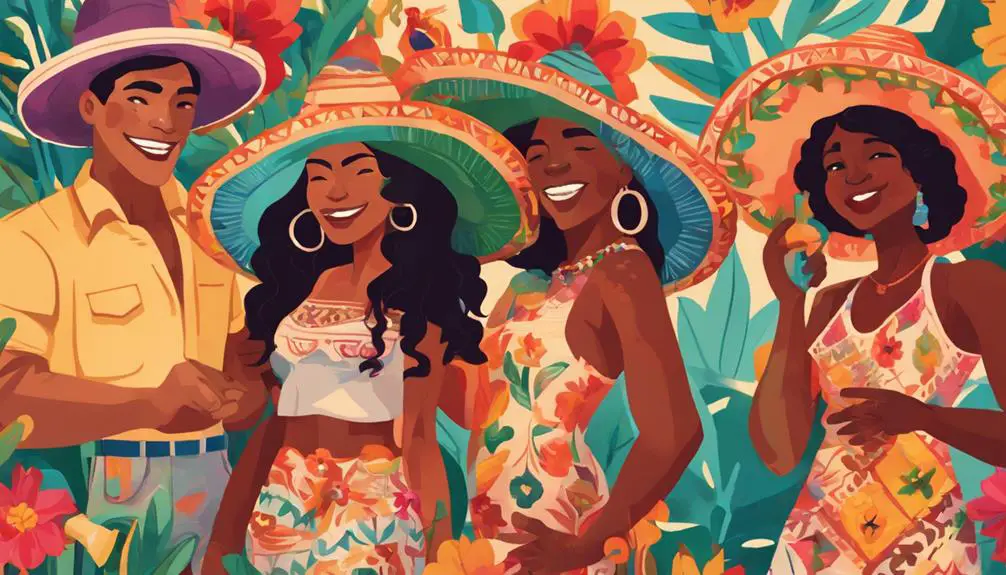You're curious about the meaning of "guero" in Spanish slang. In Latin American cultures, "guero" originally referred to people with light hair and fair skin, but it's evolved to describe anyone with light skin tone. This term is complex, as it's tied to social status, beauty standards, and cultural identity. Historically, it was used to reinforce racial hierarchies, but now it's a badge of pride for some. As you explore the nuances of "guero," you'll uncover the intricate relationships between skin tone, identity, and power dynamics, and how understanding these complexities can lead to a deeper appreciation of Latin American heritage.
History of Racial Hierarchy

Exploring the legacy of colonialism and slavery and understanding the complex racial hierarchy that underpins the concept of 'light skin' in Spanish slang, you'll discover that the historical impact of colonialism and slavery has been crucial in shaping the notion of 'light skin' in Spanish slang.
The colonial period's fixation on racial purity resulted in a strict racial hierarchy, where lighter skin tones were linked to power, privilege, and superiority. This racial hierarchy was further solidified by ethnic segregation, which separated individuals based on their race, ethnicity, and skin tone.
You will observe that the idea of 'light skin' in Spanish slang is deeply embedded in this intricate racial hierarchy. The Spanish colonizers' focus on racial purity created a system of racial categorization, where individuals were grouped according to their skin tone, with lighter skin tones being deemed superior. This classification system was used to justify the oppression of darker-skinned individuals, perpetuating a racial hierarchy that continues to impact Latin American societies today.
When examining the concept of 'light skin' in Spanish slang, it's important to grasp the historical background that has influenced this intricate racial hierarchy.
Skin Tone as Social Status
As you navigate the complex landscape of Spanish slang, you'll find that skin tone has been inextricably linked to social status, with lighter tones often serving as a proxy for wealth, education, and social standing. This phenomenon is rooted in the deeply ingrained notion that lighter skin is synonymous with beauty, intelligence, and refinement.
You'll notice that individuals with lighter skin tones are often perceived as more attractive, trustworthy, and competent, while those with darker skin tones are marginalized and stigmatized. This colorism privilege perpetuates harmful beauty standards, where Eurocentric features are idolized, and darker complexions are relegated to the periphery.
As a result, many individuals with darker skin tones feel pressured to conform to these unrealistic beauty standards, often at the cost of their self-esteem and identity. It's essential to recognize and challenge these problematic norms, promoting a more inclusive and diverse understanding of beauty that celebrates individuality and rejects the notion that skin tone is a determinant of worth.
Colonialism's Lasting Impact

The legacy of colonialism has perpetuated a racial hierarchy that privileges lighter skin tones, with the colonizer's ideology of racial superiority still lingering in the collective psyche.
As you explore further into the complexities of Spanish slang, you'll realize that the effects of colonialism are still palpable.
The cultural amnesia that has plagued many Latin American societies has led to a lack of acknowledgment of the historical trauma inflicted upon indigenous and Afro-Latinx communities.
This trauma has been passed down through generations, manifesting in the form of internalized racism and colorism.
You might notice that even today, many Latin Americans still aim for a lighter skin tone, often at the cost of their own cultural identity.
This phenomenon is a direct result of the colonial legacy, where the colonizer's beauty standards were imposed upon the colonized.
As you navigate the nuances of Spanish slang, it's crucial to recognize the lasting impact of colonialism on the Latin American psyche.
The Evolution of Guero
In Latin American slang, you'll often come across the term 'guero,' which has evolved from a derogatory label to a badge of pride, symbolizing resistance against the oppressive beauty standards imposed by colonialism. This transformation is a prime example of cultural reappropriation, where a marginalized group takes back a term meant to degrade them and flips its meaning.
The term 'guero' originated as a way to describe people with lighter skin tones, often used to highlight their proximity to European features. However, over time, it has undergone a significant linguistic evolution. Today, 'guero' is a term of endearment, embracing the unique cultural identity of those with lighter skin tones.
| Era | Meaning | Connotation |
|---|---|---|
| Colonial | Derogatory label for lighter skin tones | Negative |
| 20th Century | Term of endearment among friends | Neutral |
| Present Day | Badge of pride, symbolizing resistance | Positive |
This transformation is a demonstration of the power of language and cultural reappropriation. By reclaiming a term once used to oppress, the Latin American community has turned 'guero' into a symbol of pride and resistance.
Skin Tone and Identity

Understanding the complexities of skin tone and identity reveals that your perceived racial identity is often closely tied to your skin tone, with societal beauty standards and cultural norms influencing how you perceive yourself and others.
You may find that your skin tone affects how you're perceived by others, and even how you perceive yourself. Beauty standards, which often favor lighter skin tones, can lead you to internalize these messages, affecting your self-esteem and confidence. Cultural norms, too, play a significant role in shaping your identity, as they dictate what's deemed desirable or acceptable.
As you navigate these complex relationships, you may struggle to reconcile your own identity with the expectations imposed upon you. You might find yourself questioning your sense of belonging or wondering where you fit within the spectrum of racial identity.
Recognizing the influence of beauty standards and cultural norms, you can begin to break free from these constraints and forge a more authentic sense of self.
The Power of Affectionate Terms
As you work to reconcile your identity with societal expectations, you'll likely encounter affectionate terms that can either reinforce or challenge these norms, particularly when it comes to skin tone. In Spanish slang, affectionate terms like 'mi guapa' or 'mi morena' can convey cultural endearment, but they can also perpetuate harmful stereotypes. These terms often blur the lines between personal intimacy and cultural identity, making it imperative to examine their implications.
When used in a romantic or familial context, these terms can create a sense of belonging and closeness. However, when applied to someone based solely on their skin tone, they can become reductionist and objectifying. It's vital to recognize the power dynamics at play and consider the impact of these terms on individuals and communities.
As you navigate the complexities of identity and cultural norms, it's important to be mindful of the language you use and the cultural connotations it carries. By doing so, you can foster a deeper understanding of the intricate relationships between language, identity, and cultural endearment, ultimately promoting a more nuanced and empathetic approach to personal intimacy.
Unpacking the Guero Phenomenon

When you explore the world of Latin American culture, you'll notice that guero is often used to describe someone with lighter skin, but it's not just a physical descriptor. It's a term that's deeply tied to cultural appropriation and ethnic pride.
In some communities, guero is a badge of honor, symbolizing a connection to European ancestry and a perceived superiority. However, this phenomenon also perpetuates a damaging narrative that lighter skin is more desirable, leading to the erasure of indigenous and Afro-Latinx identities.
You'll find that guero is often used to exoticize and fetishize lighter-skinned individuals, particularly women, reinforcing harmful beauty standards. As you navigate the complexities of guero, remember that it's crucial to acknowledge the cultural appropriation and racism embedded in this term, and to celebrate the diversity and richness of Latin American identities.
Frequently Asked Questions
What Does "Guero" Mean in Mexican Slang?
You might be curious about the term 'guero' in Mexican slang. Essentially, it refers to someone with a lighter complexion, often carrying a cultural significance of privilege and social status.
Historically, this term emerged during the colonial era, where lighter skin was associated with European ancestry and superiority.
You'll find that 'guero' is still used today, often with a mix of admiration and resentment, reflecting Mexico's complex historical context and ongoing social dynamics.
Is "Guero" a Term of Endearment or Insult?
You might think 'guero' is a straightforward term, but scratch the surface and you'll find a complex web of cultural nuance and racial undertones.
When someone calls you 'guero,' are they showing affection or making a subtle dig at your light skin? The answer lies in the tone, context, and relationship.
In some cases, it's a term of endearment, while in others, it's a veiled insult. You need to read between the lines to decipher the intention behind this loaded term.
Are "Guero" and "Gringo" Interchangeable Terms?
As you navigate the complexities of Latin American Identity, you wonder if 'guero' and 'gringo' are interchangeable terms. While both refer to foreigners or outsiders, they've distinct connotations.
'Gringo' often carries a negative tone, implying cultural appropriation or ignorance. 'Guero', on the other hand, can be a term of endearment.
Don't assume they're interchangeable; understanding their nuances is essential in avoiding cultural insensitivity. Use them thoughtfully to show respect for Latin American cultures.
Can Anyone Be Referred to as "Guero", Regardless of Skin Tone?
Are you wondering if a term like 'guero' can be slapped on anyone, regardless of skin tone? Not quite.
In many Latin American cultures, 'guero' is a term deeply tied to cultural identity and social hierarchy. While it's often associated with light skin, it's not solely about complexion. You can't just be referred to as 'guero' without considering the complex web of social and cultural nuances that come with it.
It's not a label you can simply claim; it's a cultural identity that's earned through shared experiences and community recognition.
Is the Term "Guero" Exclusively Used in Mexico?
You might assume that the term 'guero' is exclusively used in Mexico, but that's not entirely true. While it's indeed popular in Mexico, regional dialects and Latin American variations of Spanish also employ the term.
In fact, 'guero' can be found in countries like Chile, Argentina, and Peru, albeit with slightly different connotations. So, while Mexico might be its hub, 'guero' has transcended borders, adapting to local nuances.
Conclusion
As you walk through the vibrant streets of a Latin American city, the sounds of laughter and music fill the air, but amidst the joy, a subtle undertone of racial hierarchy lingers.
The term 'guero' echoes through generations, a reminder of colonialism's lasting impact on skin tone and identity.
Like a delicate thread, it weaves together social status, affection, and power, a complex tapestry that still unfolds today, whispering secrets of a troubled past.







